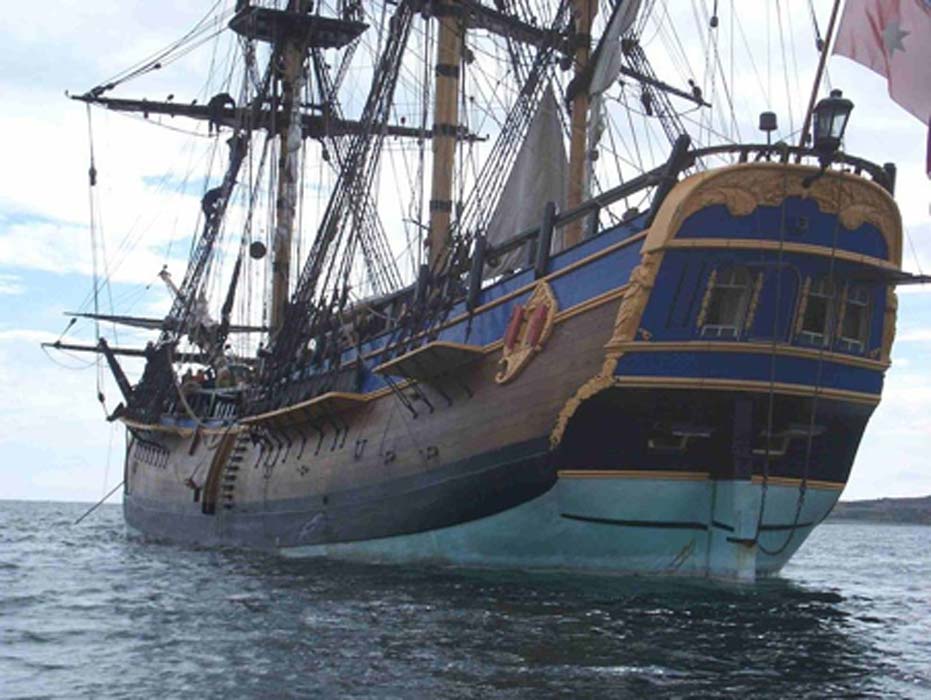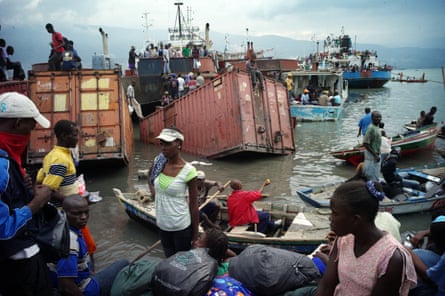W
hen Bill and Hillary Clinton travelled to the Caribbean nation of Haiti as newlyweds in 1975, they were enchanted. Bill had recently lost a race for Congress back home in Arkansas, but by the time they returned to the US, he had set his mind to running for Arkansas state attorney general, a decision which would put him on the path to the White House. “We have had a deep connection to and with Haiti ever since,” Hillary later said.
Over the next four decades, the Clintons became increasingly involved in Haiti, working to reshape the country in profound ways. As US president in the 1990s, Bill lobbied for sweeping changes to Haiti’s agricultural sector that significantly increased the country’s dependence on American food crops. In 1994, three years after a military coup in Haiti, Bill ordered a US invasion that overthrew the junta and restored the country’s democratically elected president to power. Fifteen years later, Bill was appointed United Nations’ special envoy to Haiti, tasked with helping the country to develop its private sector and invigorate its economy. By 2010, the Clintons were two of Haiti’s largest benefactors. Their personal philanthropic fund, The Clinton Foundation, had 34 projects in the country, focused on things such as creating jobs.
Over their many decades of involvement there, the Clintons became two of the leading proponents of a particular approach to improving Haiti’s fortunes, one that relies on making the country an attractive place for multinational companies to do business. They have done this by combining foreign aid with diplomacy, attracting foreign financing to build factories, roads and other infrastructure that, in many cases, Haitian taxpayers must repay. Hillary has called this “economic statecraft”; others have called it a “neoliberal” approach to aid.
The most significant test of this approach in Haiti began on 12 January 2010, when a magnitude 7.0 earthquake struck just west of the capital, Port-au-Prince. In a nation of 10 million people, 1.6 million were displaced by the disaster, and as many as 316,000 are estimated to have died. The earthquake also dealt a huge blow to Haiti’s economic development, levelling homes and businesses in the most populous area of the country and destroying crucial infrastructure, including the nation’s biggest port.
Within days of the earthquake, the Clintons stepped up to lead the global response. Bill was selected to co-chair the commission tasked with directing relief spending. As US secretary of state, Hillary helped to oversee $4.4bn that Congress had earmarked for recovery efforts by the US Agency for International Development, or USAid. “At every stage of Haiti’s reconstruction – fundraising, oversight and allocation – a Clinton was now involved,” Jonathan Katz, a journalist who has covered Haiti for more than a decade, wrote in 2015.
There was no greater embodiment of the neoliberal approach to aid in Haiti than the US’s largest post-earthquake project – a $300m, 600-acre industrial park called Caracol, on the country’s northern coast. To make the park more attractive, the US also agreed to finance a power plant, and a new port through which firms operating at Caracol could ship in materials such as cotton, and ship out finished products including T-shirts and jeans.
The Clintons and their allies believed the Caracol project would attract international manufacturers, which they saw as the primary fix to Haiti’s faltering economy. “Haiti has failed, failed and failed again,” wrote the British economist Paul Collier and his colleague Jean-Louis Warnholz, who have both advised the Clintons, in the Financial Times two weeks after the earthquake. By building “critical assets such as ports”, they argued, the US and its allies could help Haiti attract private, foreign investment and create the stable jobs it needed to prosper.
Ten years later, the industrial park is widely considered to have failed to deliver the economic transformation the Clintons promised. But less attention has been paid to the fate of the port. Last year, after sinking tens of millions of dollars into the port project, the US quietly abandoned it. The port is now one of the final failures in an American post-earthquake plan for Haiti that has been characterised by disappointment throughout. It is also the latest in a long line of supposed solutions to Haiti’s woes that have done little – or worse – to serve the country’s interests. “The neoliberal, exploitative economic model currently being imposed” on Haiti “has failed many times before,” Antony Loewenstein, author of Disaster Capitalism: Making a Killing Out of Catastrophe, has written. The result, he adds, is that many Haitians are living “in a state of despair and daily desperation”.
H
aiti makes up the western third of the island of Hispaniola – the other two-thirds are the Dominican Republic – situated between the Atlantic and the Caribbean along several major international shipping lanes. “It’s a strategic location,” says Claude Lamothe, the former director of a small port in the northern city of Cap-Haïtien. “All the big boats from the US pass right by here.”
For decades, the vast majority of goods coming to or leaving Haiti travelled through the ageing port at Port-au-Prince in the south. In the 70s, that port handled 90% of Haiti’s imports and 60% of its exports (including thousands of baseballs destined for the US, some for the Major League). But by the late 2000s, the fees it charged companies to dock, load and offload their goods were higher than any other port in the region. So companies turned to ports in the Dominican Republic, Cuba, the Bahamas or Trinidad and Tobago instead. When the earthquake hit, a large section of the port at Port-au-Prince collapsed into the sea. “The damage was unbelievable,” said Russell Green, a civil engineer at Virginia Tech University, who arrived to survey the port a few weeks after the disaster.
Just before the earthquake hit, Paul Collier had published a report for the UN that laid out a vision for Haiti in which international manufacturing and trade would create hundreds of thousands of jobs in a few short years and drive the country’s economy into the future. His plan was a particularly clear expression of the neoliberal prescription for aid: reduce taxes on businesses to attract foreign investment, reduce tariffs to make it cheaper to buy and sell goods and offer loans to finance the infrastructure necessary to accommodate the rest. All this would create jobs, and these new wage-earners would then spend their money on goods from abroad. Everybody, in theory, would win.
Port-au-Prince in Haiti during the aftermath of the 2010 earthquake. Photograph: Olivier Laban Mattei/AFP/Getty
The new port was a key part of this vision. There were several obvious locations for it in and around the earthquake-devastated capital, where hundreds of thousands of displaced people would have provided a ready workforce. Ultimately, however, USAid decided to build the park and port near Cap-Haïtien, on the country’s northern coast, 650 miles south-east of Miami, Florida.
A 2011 US government report declared: “With its proximity to Miami, a new container port in this region could become a hub for the north,” which had “untapped potential” in light manufacturing, such as garments, and in certain kinds of high-value agriculture. Companies such as the major Korean textile manufacturer Sae-A, which became one of Caracol’s first tenants, would be able to ship in cotton and ship out apparel. “A port – that was the carrot for these companies,” Jake Johnston, a Haiti expert at the Center for Economic and Policy Research (CEPR), a liberal thinktank, told me.
But the location was attractive for other reasons, too. “Land was readily available in the north,” and the “hundreds of small farmers who had to be moved” to make way for the park and port “were far less resistant than the wealthy landowners in the capital,” Johnston wrote in 2014. Members of Haiti’s northern elite were also lobbying Bill Clinton to invest in the region, says Leslie Voltaire, who served alongside Bill as Haiti’s special envoy to the UN from 2009 to 2010.
Haitians themselves had remarkably little control over these plans. Between April 2010 and October 2011, decisions about how to rebuild Haiti were made not by Haiti’s parliament, but by the Interim Haiti Recovery Commission, which Bill co-chaired. This was supposed to be a Haitian-led body, but in December 2010, the 12 Haitian members of the committee wrote a letter declaring: “In reality, Haitian members of the board have one role: to endorse the decisions made by the director and executive committee,” which included donors and other Clinton allies.
Haiti’s then-president, a musician-turned politician named Michel Martelly, seemed reluctant to push back against the US’s redevelopment ideas, according to Voltaire. “At that time, Clinton was very close to Martelly,” he told me. “Martelly is an amateur and he respects Clinton’s ideas. They would follow whatever USAid and Clinton would say.” (Martelly did not respond to a request for an interview.)
“You have to put it in context,” Voltaire continued. “Almost all the countries in the world would want someone like Bill Clinton to be a lobbyist for his country.” A former US president with ties to major investors across the globe was expending political capital to help Haiti rebuild. For Haiti, “it was a double asset,” Voltaire went on, “because his wife was secretary of state,” and had influence over USAid, which controlled most of the US’s post-earthquake spending.
In the months after the earthquake, Bill worked tirelessly to attract manufacturing companies to the Caracol industrial park. When construction on the park broke ground in 2011, Bill laid the first foundation stone. A year later, at the park’s opening ceremony, Bill looked on as Hillary delivered a speech promising that the park would lead Haiti toward economic independence.
I
nternational trade has dictated Haiti’s economy almost since Christopher Columbus landed on Hispaniola by mistake, in 1492. After Spain and later France colonised the island, they imported African slaves to produce one of the most lucrative commodities in history – sugar – and exported it around the globe. By the eve of Haiti’s independence, which Haitians won in 1804, global trade had made the country one of the most profitable pieces of land in the world.
But all this international commerce has rarely benefited the vast majority of Haitians. Little of the wealth generated in the country has ever stayed there. For almost its entire history, Haiti has owed a trade debt to other nations – most notably, a $21bn (in today’s money) burden levied by France after independence. During the two centuries that followed, the effect of these debts has been to severely impoverish the country, and to make it beholden to the rich nations who have acted as its creditors. In the past 100 years, the US and the international financial institutions it partners with have been the most important of these creditors, indebting Haiti by extending foreign development loans and creating a trade imbalance – an early form of the neoliberal model.
But what worked for the US’s interests worked less well for Haiti. By the 1950s, neither Haiti’s agricultural economy, nor the dollars spent by thousands of American tourists every year, was enough to pay back those debts. By 1961, the US was sending $13m in aid to Haiti – half Haiti’s national budget – in part to help the nation bolster industry. Much of this early US aid to Haiti was looted or wasted by Haiti’s autocratic leaders, especially François “Papa Doc” Duvalier, and his son, Jean-Claude, who spent it on personal militias that terrorised Haiti’s citizenry. “Since 1946, the United States has poured about $100m in economic aid … into Haiti without much to show for the money,” the New York Times reported in 1963.
Aid from the US and loans from international financial institutions failed to lift Haiti out of poverty. And yet, American aid kept pouring in. When the Clintons and their allies sought to mould Haiti’s economic future around manufacturing and trade, it was essentially the same neoliberal programme that the US had been pushing for decades.
The most pernicious part of this programme was the agricultural policies that the US imposed on Haiti beginning in the 70s. The US pressured Haiti to reduce its tariffs on imported crops, then shipped surplus American crops into Haiti’s ports under the guise of “food aid”. Haitian farmers could not compete with all the artificially cheap rice and other food crops from abroad, which was part of the point. The strategy was to create another market for American farmers while pushing Haiti’s labour force away from the fields and into factories. As president, Bill Clinton furthered this programme, creating massive surpluses of crops such as rice by extending hundreds of millions of dollars in subsidies to US farmers. In Haiti, the result was that thousands upon thousands of farmers lost their land, but industrialisation never moved fast enough to replace their livelihoods.
Only years later would Bill Clinton acknowledge how this policy had failed Haitians.“The United States has followed a policy … that we rich countries that produce a lot of food should sell it to poor countries and relieve them of the burden of producing their own food, so, thank goodness, they can leap directly into the industrial era,” he told Congress in 2010. “It may have been good for some of my farmers in Arkansas, but it has not worked … I have to live every day with the consequences of the lost capacity to produce a rice crop in Haiti to feed those people.” By the time the earthquake struck, in 2010, a nation that in the 70s grew enough rice to feed itself was now importing 80% of it from abroad.
“Artibonite used to be rich, but now it’s poor,” Denis Jesu-car, a rice farmer in one of Haiti’s most agriculturally rich regions, once explained to me. “We produce rice, but it doesn’t sell.”
D
espite his acknowledgement that the US’s prior attempt to liberalise Haiti’s economy had decimated its agricultural sector, in 2010, after the earthquake struck, Bill Clinton and his allies prescribed the same, familiar medicine – this time in the form of construction projects and clothing, instead of rice.
One year later, Bill presided over a conference at which building firms from across the globe presented their designs for permanent housing for the displaced, most of which never came to fruition, in part because many were financially or practically infeasible, and in part for lack of land on which to build them. The largest piece of real estate of Haiti’s post-earthquake reconstruction was not built for poor Haitians at all, but for wealthy ones and foreigners: a new Marriott hotel in Port-au-Prince, financed by a multinational telecoms corporation whose chairman was a friend of Clinton’s. The Clinton Foundation brokered the deal, and Bill inaugurated the hotel in 2015.
The flagship projects of Haiti’s reconstruction were the Caracol industrial park and a power plant and new port that were to come with it. “Each must be completed and remain viable for the others to succeed,” the US Government Accountability Office, Congress’s official financial watchdog, wrote in an audit of the project in 2013. But the audit also found that USAid, which was leading the port project, lacked “staff with technical expertise in planning, construction, and oversight of a port.” USAid, the audit pointed out, “has not constructed a port anywhere in the world since the 70s”.
Former US president Bill Clinton visiting a new power plant in Caracol, Haiti, in 2012. Photograph: Larry Downing/AP
The audit offered a damning account of USAid’s efforts to build the port. Construction was delayed from the start. The time needed to build the port was revised from an initial estimate of two-and-a-half years to 10 years – and then indefinitely. USAid had “no current projection for when construction of the port may begin or how long it will take”. This was “due in part to a lack of USAid expertise in port planning in Haiti”.
To make matters worse, in June 2015, a USAid feasibility study found that “a new port was not viable for a variety of technical, environmental and economic reasons”. What’s more, the US did not have enough money to finish the job: “USAid funding will be insufficient to cover a majority of projected costs,” with an “estimated gap” of $117m to $189m. Not only was the port not viable, it was not even wanted: the private companies USAid had hoped to attract to Haiti’s north “had no interest in supporting the construction of a new port in northern Haiti”, the feasibility study determined.
While the port stalled, the industrial park underdelivered. When Bill and Hillary Clinton flew to northern Haiti to inaugurate the $300m Caracol park in 2012, the overall project had created just 1,500 of the 65,000 jobs that were promised. In fact, many Haitians may have lost their livelihoods because of Caracol: in the end, 366 families were evicted from their land to make way for the project, according to a report by the NGO ActionAid. By June 2017, Caracol still employed only 13,000 people. (In an email, the Clinton Foundation wrote that “The Clinton Foundation did not have a role in building the Caracol Industrial Park and has never invested any funds into the park,” but acknowledged that as part of its wider goal of facilitating investment in Haiti, “the Foundation helped identify potential tenants, including Haitian companies, for the park”.)
As the US’s failure to deliver on its promises for the industrial park made international headlines, the faltering plans for the new port went overlooked. In 2013, USAid reallocated almost all of the $72m that was supposed to be used to build a new port to instead expand and modernise the small, dilapidated port in nearby Cap-Haïtien. US officials knew they were throwing good money after bad: two years prior, a study by the State Department concluded it would be a bad idea to attempt to expand that port because there simply was not enough land on which to do so.
The Cap-Haïtien port “is locked into the city”, Voltaire said. “There is no way you can expand the hangers, the customs, the container areas. There’s not enough space.” But USAid officials went ahead with it anyway. “To scrap it or to stop allocating money is to admit failure,” Johnston, the Haiti researcher said. “And that’s not something that USAid is good at.”
Finally, more than seven years after the port was conceived, USAid confronted reality. In May 2018, almost three years after a new port was originally supposed to be completed, USAid entirely abandoned its plans to build a new port or expand the old one. In August, a spokesperson explained the decision to me: “Based on proposals received and the current marketplace, it appeared that the cost of the project would significantly exceed the business forecast, cost estimate and available funding.” In short, a port was simply not economically viable. Which was precisely the conclusion that US audits and reports had come to dating back to 2011 – reports that USAid had ignored.
After the project was abandoned, US officials did not even bother to tell Haiti the news. When I visited Cap-Haïtien in December, Haitian port authorities were unaware that USAid had scrapped the project. “Last conversation we had, they told us the money is there,” Anaclé Gervè, the director of the Cap-Haïtien port, said. I told him what a USAid official told me: it had decided to cancel the port project six months earlier. Gervè leaned back in his chair. “Wow,” he said. “They didn’t tell us that.”
When I asked Gervè what the US’s $70m had achieved, he pointed to two concrete electricity poles, erected as part of a plan to connect the port to the public grid. USAid had paid for the poles, but had not strung the cables needed to electrify them.
B
y January 2019, nine years after the earthquake, USAid had spent $2.3bn in Haiti. Most of it was given to American companies and hardly any passed through Haitian hands. Less than 3% of that spending went directly to Haitian organisations or firms, according to
research by CEPR. In contrast, 55% of the money went to American companies located in and around Washington DC. Most likely, according to the research, the majority of what USAid allegedly spent on Haiti’s recovery ended right back in the US.
It is not clear what happened to the money allocated for a port in Haiti, because USAid would not tell me. In August, it released a factsheet claiming that it still planned to invest in “infrastructure upgrades” at the port, such as “improving the electricity system”. Some of these were things the agency had committed to doing previously, but that had yet to be achieved by the time I visited last December. The factsheet gave no indication of how much money was being directed to these projects, or when they would be completed. In other words, even after abandoning the idea of building a new port in favour of expanding the old one, then abandoning plans to expand the old one, too, USAid is still making new promises, still claiming it will at least do something, despite its failure to make good on earlier promises dating back almost a decade. The only physical improvements the agency claims to have made at the port are “electrical lines, security wall upgrades, a pilot boat and a security card machine”. It also claims to have trained 575 Haitian customs officers, but did not say how many of them are employed at the Cap-Haïtien port.
Over the past 12 months, I have repeatedly asked USAid spokespeople for a breakdown as to how the $70m allocated to the Cap-Haïtien port was ultimately spent. In July 2018, I submitted a Freedom of Information Act request for documents relating to the port expenditures, and last October I resubmitted the request in further detail after discussing it on the phone with a USAid official. The agency acknowledged my request, but has yet to send me a single document in response to it.
“Seventy million dollars? It’s a lot of money” for a project that never materialised, said Voltaire. For that amount, “we could have a nice port in Saint-Marc”, just a few miles north-west of Haiti’s capital. In Canaan, a new city on the outskirts of Port-au-Prince that was formed after the earthquake, he added, “they could do 72km of nice road, or 72 primary schools,” with all that money. At the end of last year, Canaan – which is now Haiti’s third-largest city – had fewer than 5km of paved roads and just one public school, for a population of 300,000.
“Here you have an industrial park an eight-hour drive north from where the quake was,” said Johnston, referring to Caracol. “And then you have this city that’s just 8km north, that was created from the earthquake – and it’s gotten nothing.”
In post-earthquake Haiti, there were all manner of things the US could have spent its money on. It could have spent that money to revitalise Haiti’s agricultural sector. In a country where only one in four people have access to basic sanitation facilities, the US could have invested in building things such as flush toilets, sewers and sewage treatment plants. In a country where 59% of the population lives on less than $2.41 per day, the US could have simply given Haitians the money. Studies have shown that such “unconditional cash transfers” can be a more effective way to increase income and access to education and housing than many types of traditional “project-based” aid. But policies like cash transfers would have undermined the approach to aid in which rich countries simply prescribe “solutions” for poor ones, rather than allowing people to take their futures into their own hands.
Little about the US’s foreign policy toward Haiti has changed since the 2010 earthquake. The US continues to send the country surplus crops through the Food for Peace programme to this day. Hillary Clinton stepped down as US secretary of state in 2013, but her successors have championed the same sort of private-sector-focused development. USAid continues to spend money to boost Haiti’s textile industry, and the US government continues to advertise Haiti as a business opportunity for US investors.
In spite of its failures to ring in a new era of prosperity for Haiti by building an industrial park and a port, the US is undeterred in its belief that industry and manufacturing are the key to Haiti’s future. “Despite the challenges, there are opportunities in the Haitian market for small-to-medium-sized US businesses,” wrote the US Department of Commerce in August. “The apparel sector is the most promising opportunity in the manufacturing sector in Haiti.”



















